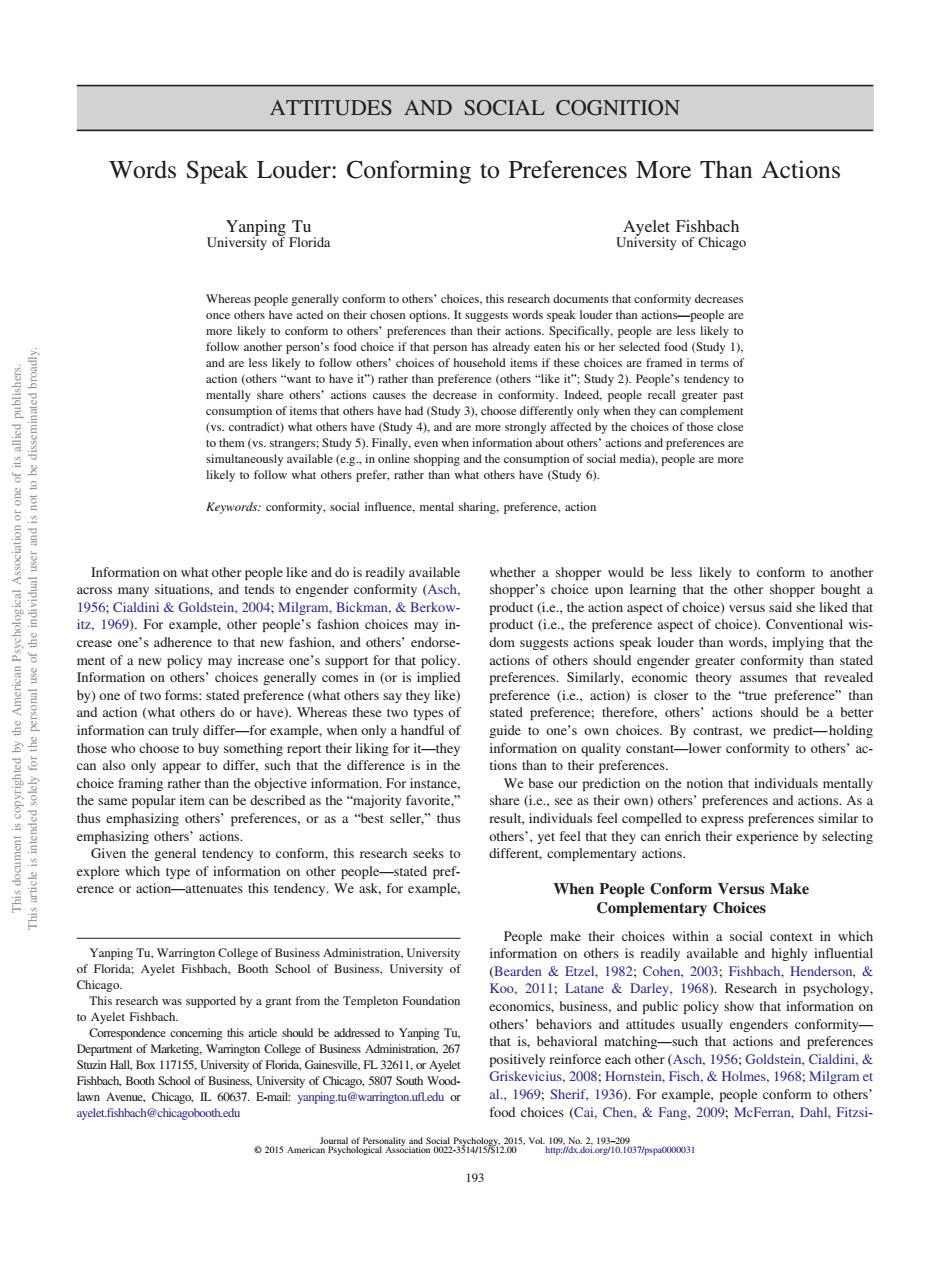正在加载图片...

ATTITUDES AND SOCIAL COGNITION Words Speak Louder:Conforming to Preferences More Than Actions Uayd e, choices of household y 2) adict)what o Kevwords:conformity,social influence,mental sharing,preference,action ople like and do is readily whether a m to t ople fashion choices mayin ntional wis one's adherence to that new fashion,and others preferences.Similarly,theory assumes that revealed s say they lik uide to one's owr m hoice predict holding -lower conformity to others'ac hoice framing rather than the obje ation.For instanc We base our prediction on the notic n that indivi ess preferences similar to explore which type of inform on on other erence or actio attenuates this tendency.We ask.for example People make their choices within a social cone in which a0 ishh K00.201i Latane&Darley.1968).Rese was supported by a grant from the Templeton Foundation ch in psychology Ayelet Fishba busines that information on that is behavioral matching hac ence 1715. 19ATTITUDES AND SOCIAL COGNITION Words Speak Louder: Conforming to Preferences More Than Actions Yanping Tu University of Florida Ayelet Fishbach University of Chicago Whereas people generally conform to others’ choices, this research documents that conformity decreases once others have acted on their chosen options. It suggests words speak louder than actions—people are more likely to conform to others’ preferences than their actions. Specifically, people are less likely to follow another person’s food choice if that person has already eaten his or her selected food (Study 1), and are less likely to follow others’ choices of household items if these choices are framed in terms of action (others “want to have it”) rather than preference (others “like it”; Study 2). People’s tendency to mentally share others’ actions causes the decrease in conformity. Indeed, people recall greater past consumption of items that others have had (Study 3), choose differently only when they can complement (vs. contradict) what others have (Study 4), and are more strongly affected by the choices of those close to them (vs. strangers; Study 5). Finally, even when information about others’ actions and preferences are simultaneously available (e.g., in online shopping and the consumption of social media), people are more likely to follow what others prefer, rather than what others have (Study 6). Keywords: conformity, social influence, mental sharing, preference, action Information on what other people like and do is readily available across many situations, and tends to engender conformity (Asch, 1956; Cialdini & Goldstein, 2004; Milgram, Bickman, & Berkowitz, 1969). For example, other people’s fashion choices may increase one’s adherence to that new fashion, and others’ endorsement of a new policy may increase one’s support for that policy. Information on others’ choices generally comes in (or is implied by) one of two forms: stated preference (what others say they like) and action (what others do or have). Whereas these two types of information can truly differ—for example, when only a handful of those who choose to buy something report their liking for it—they can also only appear to differ, such that the difference is in the choice framing rather than the objective information. For instance, the same popular item can be described as the “majority favorite,” thus emphasizing others’ preferences, or as a “best seller,” thus emphasizing others’ actions. Given the general tendency to conform, this research seeks to explore which type of information on other people—stated preference or action—attenuates this tendency. We ask, for example, whether a shopper would be less likely to conform to another shopper’s choice upon learning that the other shopper bought a product (i.e., the action aspect of choice) versus said she liked that product (i.e., the preference aspect of choice). Conventional wisdom suggests actions speak louder than words, implying that the actions of others should engender greater conformity than stated preferences. Similarly, economic theory assumes that revealed preference (i.e., action) is closer to the “true preference” than stated preference; therefore, others’ actions should be a better guide to one’s own choices. By contrast, we predict— holding information on quality constant—lower conformity to others’ actions than to their preferences. We base our prediction on the notion that individuals mentally share (i.e., see as their own) others’ preferences and actions. As a result, individuals feel compelled to express preferences similar to others’, yet feel that they can enrich their experience by selecting different, complementary actions. When People Conform Versus Make Complementary Choices People make their choices within a social context in which information on others is readily available and highly influential (Bearden & Etzel, 1982; Cohen, 2003; Fishbach, Henderson, & Koo, 2011; Latane & Darley, 1968). Research in psychology, economics, business, and public policy show that information on others’ behaviors and attitudes usually engenders conformity— that is, behavioral matching—such that actions and preferences positively reinforce each other (Asch, 1956; Goldstein, Cialdini, & Griskevicius, 2008; Hornstein, Fisch, & Holmes, 1968; Milgram et al., 1969; Sherif, 1936). For example, people conform to others’ food choices (Cai, Chen, & Fang, 2009; McFerran, Dahl, FitzsiYanping Tu, Warrington College of Business Administration, University of Florida; Ayelet Fishbach, Booth School of Business, University of Chicago. This research was supported by a grant from the Templeton Foundation to Ayelet Fishbach. Correspondence concerning this article should be addressed to Yanping Tu, Department of Marketing, Warrington College of Business Administration, 267 Stuzin Hall, Box 117155, University of Florida, Gainesville, FL 32611, or Ayelet Fishbach, Booth School of Business, University of Chicago, 5807 South Woodlawn Avenue, Chicago, IL 60637. E-mail: yanping.tu@warrington.ufl.edu or ayelet.fishbach@chicagobooth.edu This document is copyrighted by the American Psychological Association or one of its allied publishers. This article is intended solely for the personal use of the individual user and is not to be disseminated broadly. Journal of Personality and Social Psychology, 2015, Vol. 109, No. 2, 193–209 © 2015 American Psychological Association 0022-3514/15/$12.00 http://dx.doi.org/10.1037/pspa0000031 193